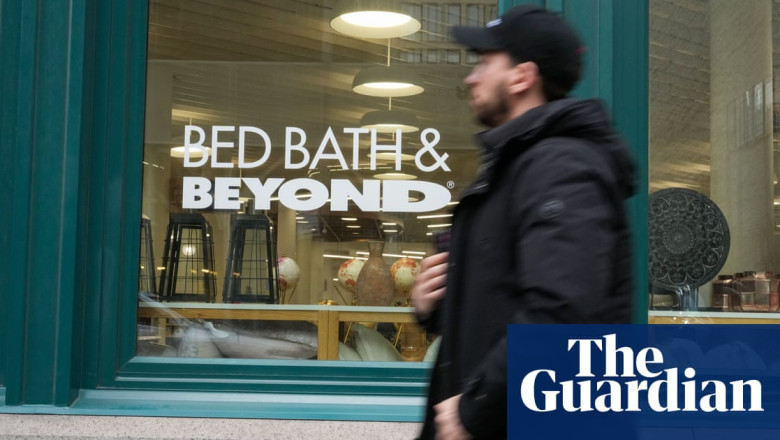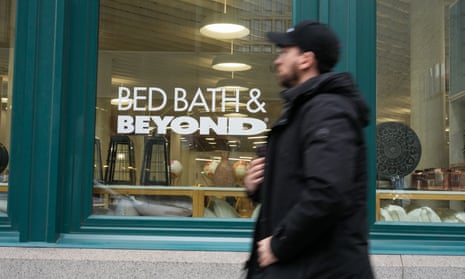
views
The US home retailer, once worth $17bn, looks destined to enter chapter 11 despite a market rally this week. What went wrong?
 Bed Bath & Beyond in New York. The company has doubts it can stay in business after a quarter of deep losses and declining sales. Photograph: John Nacion/Rex/ShutterstockBed Bath & Beyond in New York. The company has doubts it can stay in business after a quarter of deep losses and declining sales. Photograph: John Nacion/Rex/ShutterstockEdward Helmore in New YorkSat 14 Jan 2023 06.00 EST
Bed Bath & Beyond in New York. The company has doubts it can stay in business after a quarter of deep losses and declining sales. Photograph: John Nacion/Rex/ShutterstockBed Bath & Beyond in New York. The company has doubts it can stay in business after a quarter of deep losses and declining sales. Photograph: John Nacion/Rex/ShutterstockEdward Helmore in New YorkSat 14 Jan 2023 06.00 EST
Bed Bath & Beyond, the pioneering home goods retailer, appears to be heading for bankruptcy. But you wouldn’t necessarily know it from visiting its flagship store in New York’s Chelsea neighbourhood – or by looking at its share price this week.
Last year Bed Bath & Beyond was one of the so-called “meme stocks”, including Gamestop, an ailing video games retailer, and cinema chain AMC, whose share prices were driven to dizzying heights by a new generation of online traders.
This week, BB&B was foaming again, with its share price more than doubling over the week amid speculation on online stock forums, including Reddit, that it might be a potential acquisition target.
The company’s Chelsea store appears to be faring better than most, busy with shoppers browsing the aisles but with many items heavily discounted.
Still, some shoppers were unsure about the company’s future. “It’s a great store, but at other locations, there’s almost no products on the shelves,” said Chintan Patel.
He said he’d followed Bed Bath & Beyond through its existential crisis. “It was one hundred per cent a pump-and-dump started by the management,” Patel said. Another shopper said the company had “kind of screwed themselves”.
Indeed, it does seem unlikely that Chelsea’s shoppers, or meme stock traders, can save Bed Bath & Beyond now.
The company said last week it could enter chapter 11 bankruptcy within weeks, and has doubts it can stay in business after a quarter of deep losses and declining sales, causing its stock to drop more than 30%. Even this week’s rally – which took its shares to close to $5 – leaves its share price down 68% over the year.
On Tuesday, the company reported losses of nearly $400m. In October, more than 40% of the retailer’s products were out of stock, twice the level in the first half of the year, as suppliers walked away.
“A third of revenue has vanished, plunging an already beleaguered company into the depths of chaos,” said Neil Saunders, managing director of GlobalData.
The Bed Bath & Beyond story, though, is a strange tale of the power and destruction of the internet. While Wall Street analysts believed Amazon, Walmart and others would eat the retailer’s business, the company’s stock soared on a wave of enthusiasm last year after billionaire Ryan Cohen, the founder of online pet food company Chewy, bought more than 7m shares in the company.
Online investors following the r/wallstreetbets forum on Reddit crowned Cohen as “the meme king who will reign for 1,000 years” and piled in.
Whether or not investors actually thought Bed Bath & Beyond was a solid business, or just saw an opportunity to pump up the price and then sell, is an open question.
Other headline meme stocks that online traders used to punish hedge funds and other investors that were betting against them have also crashed to earth. Shares in GameStop have fallen 70% since January 2022, and AMC shares down down 82% over the same period.
Last August, the party came to an end when Cohen announced plans to sell off his 9.8% stake in the company, making him $178m, and triggering a selloff among meme stock followers and allegations of a pump-and-dump scheme. A month later, Bed Bath & Beyond’s former chief financial officer, Gustavo Arnal, died after jumping from a luxury skyscraper in Manhattan.
By then, the retailer’s stock had lost more than 70% of its value in the year, and the company said it was looking to turn things around with a strong holiday season.
But attempts to streamline its product line were complicated by pandemic bottlenecks, a lack of online investment, and frustrated consumers who had abruptly returned to in-person shopping only to find selections lacking.
Unlike many retailers, Bed Bath & Beyond had not been typical of retailers collapsing under competition from online retailers like Amazon. At its peak in 2013, BB&B was valued at $17bn. A company that had not added debt to its balance sheet in two decades, took on $1.5bn in debt as shoppers moved online.
In August, the company took on more debt, after post-pandemic shoppers failed to materialize. This week, the retailer’s value was close to $550m.
“Multiple paths are being explored, and we are determining our next steps thoroughly, and in a timely manner,” the chief executive, Susan Gove, who four months ago launched a turnaround plan, said in a statement.
But if, or when, Bed Bath & Beyond seeks bankruptcy protection, many will rue its demise. The chain was founded in 1971 by Leonard Feinstein and Warren Eisenberg, who opened the first store in Springfield, New Jersey, as Bed n’ Bath. By 1987, as the fashion for big-box stores exploded, Bed n’ Bath expanded beyond the state, added more products and the “Beyond” label to its name, and became a classic category killer. It went public in 1992, and crossed $1bn in sales six years later.
As shoppers perused the aisles on Tuesday, many speculated that their days of shopping in-store were numbered. Standing on Sixth Avenue, Michael Fekete said he hadn’t bought into Bed Bath & Beyond’s stock surge of 2021 and he wasn’t buying it now.
“I don’t think the market is necessarily going to allow these mega stores to continue to exist,” he said. “My guess is they go online only. We’ve seen a lot of the other department-store retailers go that way.”





















Comments
0 comment